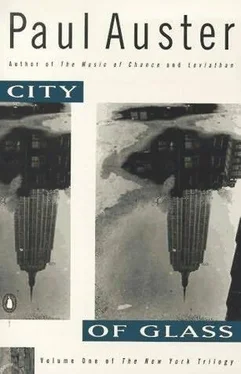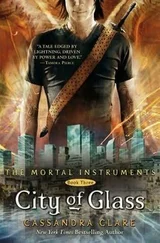Paul Auster - City of Glass
Здесь есть возможность читать онлайн «Paul Auster - City of Glass» весь текст электронной книги совершенно бесплатно (целиком полную версию без сокращений). В некоторых случаях можно слушать аудио, скачать через торрент в формате fb2 и присутствует краткое содержание. Жанр: Современная проза, на английском языке. Описание произведения, (предисловие) а так же отзывы посетителей доступны на портале библиотеки ЛибКат.
- Название:City of Glass
- Автор:
- Жанр:
- Год:неизвестен
- ISBN:нет данных
- Рейтинг книги:5 / 5. Голосов: 1
-
Избранное:Добавить в избранное
- Отзывы:
-
Ваша оценка:
- 100
- 1
- 2
- 3
- 4
- 5
City of Glass: краткое содержание, описание и аннотация
Предлагаем к чтению аннотацию, описание, краткое содержание или предисловие (зависит от того, что написал сам автор книги «City of Glass»). Если вы не нашли необходимую информацию о книге — напишите в комментариях, мы постараемся отыскать её.
City of Glass — читать онлайн бесплатно полную книгу (весь текст) целиком
Ниже представлен текст книги, разбитый по страницам. Система сохранения места последней прочитанной страницы, позволяет с удобством читать онлайн бесплатно книгу «City of Glass», без необходимости каждый раз заново искать на чём Вы остановились. Поставьте закладку, и сможете в любой момент перейти на страницу, на которой закончили чтение.
Интервал:
Закладка:
"No," said Auster, who had listened attentively to Quinn's monologue. "If I had been in your place, I probably would have done the same thing."
These words came as a great relief to Quinn, as if, at long last, the burden was no longer his alone. He felt like taking Auster in his arms and declaring his friendship for life.
"You see," said Quinn, "I'm not making it up. I even have proof."' He took out his wallet and removed the five-hundred-dollar check that Virginia Stillman had written two weeks earlier. He handed it to Auster. "You see," he said. "It's even made out to you. "
Auster looked the check over carefully and nodded. "It seems to be a perfectly normal check."
"Well, it's yours," said Quinn. "I want you to have it."
"I couldn't possibly accept it."
"It's of no use to me." Quinn looked around the apartment and gestured vaguely. "Buy yourself some more books. Or a few toys for your kid."
"This is money you've earned. You deserve to have it yourself." Auster paused for a moment. "There's one thing I'll do for you, though. Since the check is in my name, I'll cash it for you. I'll take it to my bank tomorrow morning, deposit it in my account, and give you the money when it clears."
Quinn did not say anything.
"All right?" Auster asked. "Is it agreed?"
"All right," said Quinn at last. "We'll see what happens."
Auster put the check on the coffee table, as if to say the matter had been settled. Then he leaned back on the sofa and looked Quinn in the eyes. "There's a much more important question than the check," he said. "The fact that my name has been mixed up in this. I don't understand it at all."
"I wonder if you've had any trouble with your phone lately. Wires sometimes get crossed. A person tries to call a number, and even though he dials correctly, he gets someone else."
“Yes, that's happened to me before. But even if my phone was broken, that doesn't explain the real problem. It would tell us why the call went to you, but not why they wanted to speak to me in the first place."
"Is it possible that you know the people involved?"
"I've never heard of the Stillmans."
"Maybe someone wanted to play a practical joke on you."
"I don't hang around with people like that."
"You never know."
"But the fact is, it's not a joke. It's a real case with real people. "
"Yes," said Quinn after a long silence. "I'm aware of that."
They had come to the end of what they could talk about. Beyond that point there was nothing: the random thoughts of men who knew nothing. Quinn realized that he should be going. He had been there almost an hour, and the time was approaching for his call to Virginia Stillman. Nevertheless, he was reluctant to move. The chair was comfortable, and the beer had gone slightly to his head. This Auster was the first intelligent person he had spoken to in a long time. He had read Quinn's old work, he had admired it, he had been looking forward to more. In spite of everything, it was impossible for Quinn not to feel glad of this.
They sat there for a short time without saying anything. At last, Auster gave a little shrug, which seemed to acknowledge that they had come to an impasse. He stood up and said, "I was about to make some lunch for myself. It's no trouble making it for two."
Quinn hesitated. It was as though Auster had read his thoughts, divining the thing he wanted most-to eat, to have an excuse to stay a while. "I really should be going," he said. "But yes, thank you. A little food can't do any harm."
"How does a ham omelette sound?"
"Sounds good."
Auster retreated to the kitchen to prepare the food. Quinn would have liked to offer to help, but he could not budge. His body felt like a stone. For want of any other idea, he closed his eyes. In the past, it had sometimes comforted him to make the world disappear. This time, however, Quinn found nothing interesting inside his head. It seemed as though things had ground to a halt in there. Then, from the darkness, he began to hear a voice, a chanting, idiotic voice that sang the same sentence over and over again: "You can't make an omelette without breaking eggs." He opened his eyes to make the words stop.
There was bread and butter, more beer, knives and forks, salt and pepper, napkins, and omelettes, two of them, oozing on white plates. Quinn ate with crude intensity, polishing off the meal in what seemed a matter of seconds. After that, he made a great effort to be calm. Tears lurked mysteriously behind his eyes, and his voice seemed to tremble as he spoke, but somehow he managed to hold his own. To prove that he was not a self-obsessed ingrate, he began to question Auster about his writing. Auster was somewhat reticent about it, but at last he conceded that he was working on a book of essays. The current piece was about Don Quixote.
"One of my favorite books," said Quinn.
"Yes, mine too. There's nothing like it."
Quinn asked him about the essay.
"I suppose you could call it speculative, since I'm not really out to prove anything. In fact, it's all done tongue-in-cheek. An imaginative reading, I guess you could say."
"What's the gist?"
"It mostly has to do with the authorship of the book. Who wrote it, and how it was written."
"Is there any question?"
"Of course not. But I mean the book inside the book Cervantes wrote, the one he imagined he was writing."'
“Ah.”
"It's quite simple. Cervantes, if you remember, goes to great lengths to convince the reader that he is not the author. The book, he says, was written in Arabic by Cid Hamete Benengeli. Cervantes describes how he discovered the manuscript by chance one day in the market at Toledo. He hires someone to translate it for him into Spanish, and thereafter he presents himself as no more than the editor of the translation. In fact, he cannot even vouch for the accuracy of the translation itself."
"And yet he goes on to say," Quinn added, "that Cid Hamete Benengeli's is the only true version of Don Quixote's story. All the other versions are frauds, written by imposters. He makes a great point of insisting that everything in the book really happened in the world."
"Exactly. Because the book after all is an attack on the dangers of the make-believe. He couldn't very well offer a work of the imagination to do that, could he? He had to claim that it was real."
"Still, I've always suspected that Cervantes devoured those,old romances. You can't hate something so violently unless a part of you also loves it. In some sense, Don Quixote was just a stand-in for himself."
"I agree with you. What better portrait of a writer than to show a man who has been bewitched by books?"
"Precisely. "
"ln any case, since the book is supposed to be real, it follows that the story has to be written by an eyewitness to the events that take place in it. But Cid Hamete, the acknowledged author, never makes an appearance. Not once does he claim to be present at what happens. So, my question is this: who is Cid Hamete Benengeli?"
"Yes, I see what you're getting at."
"The theory I present in the essay is that he is actually a combination of four different people. Sancho Panza is of course the witness. There's no other candidate-since he is the only one who accompanies Don Quixote on all his adventures. But Sancho can neither read nor write. Therefore, he cannot be the author. On the other hand, we know that Sancho has a great gift for language. In spite of his inane malapropisms, he can talk circles around everyone else in the book. It seems perfectly possible to me that he dictated the story to someone else-namely, to the barber and the priest, Don Quixote's good friends. They put the story into proper literary form-in Spanish-and then turned the manuscript over to Samson Carrasco, the bachelor from Salamanca, who proceeded to translate 'it into Arabic. Cervantes found the translation, had it rendered back into Spanish, and then published the book The Adventures of Don Quixote."
Читать дальшеИнтервал:
Закладка:
Похожие книги на «City of Glass»
Представляем Вашему вниманию похожие книги на «City of Glass» списком для выбора. Мы отобрали схожую по названию и смыслу литературу в надежде предоставить читателям больше вариантов отыскать новые, интересные, ещё непрочитанные произведения.
Обсуждение, отзывы о книге «City of Glass» и просто собственные мнения читателей. Оставьте ваши комментарии, напишите, что Вы думаете о произведении, его смысле или главных героях. Укажите что конкретно понравилось, а что нет, и почему Вы так считаете.












